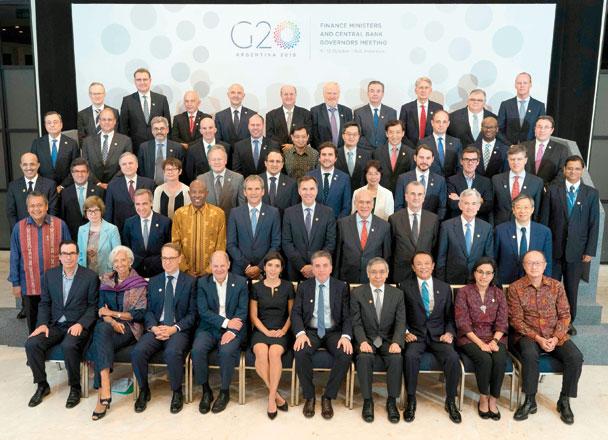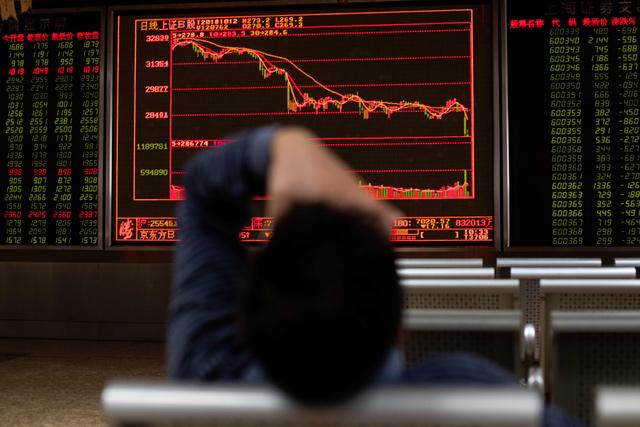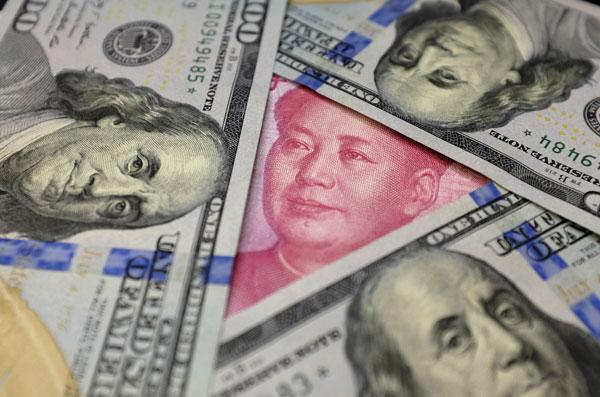You are here
Lagarde warns against trade, currency wars, urges fix to global rules
By Reuters - Oct 11,2018 - Last updated at Oct 11,2018

This handout photo taken and released by the IMF on Thursday shows G-20 finance ministers and bank governors posing for a group photograph at the Bali Nusa Dua Convention Centre prior to a dinner at the 2018 IMF/World Bank annual meetings in Nusa Dua (AFP photo)
NUSA DUA, Indonesia — International Monetary Fund (IMF) Managing Director Christine Lagarde on Thursday warned countries against engaging in trade and currency wars that hurt global growth and imperil “innocent bystanders”.
Formally launching the IMF and World Bank annual meetings on the Indonesian resort island of Bali, Lagarde urged countries to “de-escalate” trade conflicts and fix global trading rules instead of abandoning them.
The United States and China have slapped tit-for-tat tariffs on hundreds of billions of dollars of each other’s goods over the past few months, rattling financial markets as investors worry that the escalating trade conflict could knock global trade and investment.
The tariffs stem from the Trump administration’s demands that China make sweeping changes to its intellectual property practices, rein in high-technology industrial subsidies, open its markets to more foreign competition and take steps to cut a $375 billion US goods trade surplus.
Share markets in Asia plunged to a 19-month low on Thursday after Wall Street’s worst losses in eight months led to broader risk aversion, partly due to the heated global trade tensions as well as rapidly rising dollar yields.
“We certainly hope we don’t move in either direction of a trade war or a currency war. It will be detrimental on both accounts for all participants,” Lagarde told a news conference.
“And there would also be lots of innocent bystanders”, including countries that supply commodities and components to China, such as Indonesia.
Finance ministers for developing countries in the Group of 24 whose economies have been battered by stormy markets urged major economies to reform the global trading system, rather than discard it.
The G-24 statement, issued on the sidelines of the meetings, said all emerging markets were “adversely affected” by excessive capital flow volatility.
In recent weeks, US Treasury officials have expressed concerns about China’s weakened yuan as the department prepares its semi-annual report on currency manipulation.
US President Donald Trump has accused China of deliberately manipulating its currency to gain a trade advantage, claims Beijing has consistently rejected.
Treasury Secretary Steven Mnuchin met with People’s Bank of China (PBOC) Governor Yi Gang on Thursday on the sidelines of the IMF-World Bank meeting.
“We discussed important economic issues,” Mnuchin said of their meeting on Twitter.
Opposite rate cycle
Yi, in a closed door meeting on Thursday with investment officials, explained that China’s monetary policy was on an opposite rate cycle to that of the United States, which is tightening monetary policy due to a strong economy, two people who attended the meeting said.
Over the weekend, the PBOC cut bank reserve requirement ratios for a fourth time this year to ease credit conditions and support businesses, including exporters hit by the US trade war.
The PBOC did not immediately respond to Reuters’ request for comment on Yi’s remarks.
Yi also said China would continue to open up its financial markets, including to foreign ratings agencies and bond investors, the attendees said.
Lagarde weighed into the currency debate on Thursday and appeared to side with China, saying that yuan weakness against the dollar was driven by the greenback’s strength as the US Federal Reserve hikes interest rates. Against a basket of currencies, the yuan has depreciated less.
“We have supported the move of China towards [currency] flexibility and we want to encourage the authorities to continue on this path,” she said.
The yuan currency lost over 8 per cent between March and August at the height of market worries, although it has since pared losses as authorities stepped up support measures.
Lagarde said later that she believed Chinese authorities were taking steps to maintain growth, stability and investor confidence amid the trade conflict, but faced a “complicated” balancing act to keep its fiscal situation under control.
World Bank President Jim Yong Kim also warned against an escalation of the trade row, saying that if all countries maxed out their trade threats, “We’d see a clear slowdown in the economy and the impact on developing countries would be great. We’re working with every single one of our countries to prepare them in case it gets worse.”
The IMF and Pakistan on Thursday launched talks on a new bailout program aimed at easing a mounting balance of payments crisis in the South Asian country. It would be Pakistan’s 13th IMF financing programme since 1988.
The IMF and World Bank meetings, attended by more than 19,000 delegates, showed no sign of disruption from an offshore earthquake early Thursday morning between Bali and Java island that killed three people.
Kim pledged World Bank support for Indonesia in the wake of a series of earthquakes, including financing support for rebuilding schools, hospitals, roads, housing and other critical assets.
Related Articles
Nusa Dua, Indonesia — Rising US interest rates, tanking emerging market currencies and a bitter US-China trade spat could push the world tow
SHANGHAI — China's yuan hit a four-year low on Wednesday, falling for a second day after authorities devalued it, and sources said clamour i
SHANGHAI — China on Friday raised the exchange rate for the yuan against the US dollar by 0.92 per cent from the previous day, the biggest o













